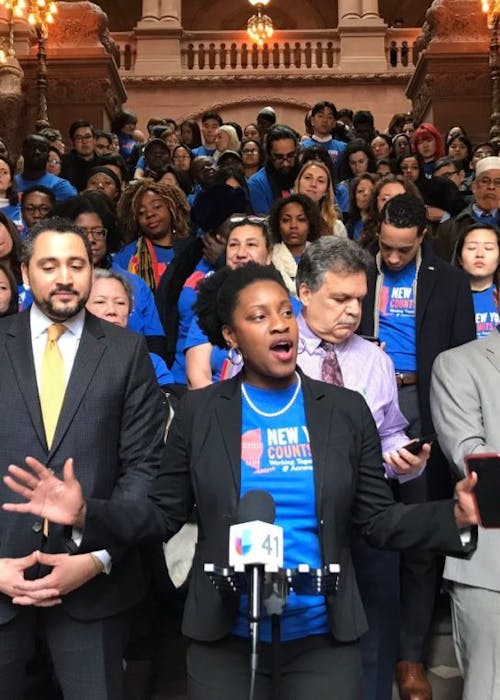

Census 2020: Why $40 Million?
Insights
March 13, 2019

The impact from the Census is felt well after the count is finished once every 10 years. That is why CCC has joined our partners on the New York Counts 2020 coalition to advocate for funding in the state budget to create a robust community outreach effort.
Yesterday, the State Senate and Assembly released their versions of the 2020 budget (called One House Budgets). We were grateful to hear that both include the $40 million for Census outreach in communities statewide. However, as the State Budget deadline approaches, it is critical that we continue to raise our voices about the important role that community-based organizations have to play in reaching hard to count communities in New York City and ensure that $40 million for Census outreach is included with the State Fiscal Year 2020 Adopted Budget.
Every ten years, there is a census count of every household in the country, known as the Decennial Census. The Census not only captures the number of people living in the United States to determine each state’s share of seats in Congress. It is also used to determine vital funding for various programs.
In 2016 alone, data from the 2010 Census steered $73.3 billion in federal funding to New York State, according to the GW Institute for Public Policy. These funds went to programs all New Yorkers use including Medicaid, public housing and student loans.
Funding from the Census also greatly impacts programs for children. The Council on Children and Families has said the state receives $6.7 billion annually in federal funding for programs targeting children. These include special education grants, children’s health insurance and early childhood programs such as Head Start.
Needless to say, ensuring an accurate count of New York State’s population is critical for all of us.
However, New York has a history of being undercounted. According to the Fiscal Policy Institute, there are 4.8 million hard-to-count New Yorkers. Hard-to-count populations may face barriers to participation including geographic or linguistic isolation, lack of internet access, discomfort with sharing personal information, or distrust of the government.
Barriers to being counted:
Hard-to-count populations may face barriers to participation including geographic or linguistic isolation, lack of internet access, discomfort with sharing personal information, or distrust of the government.
The best way to engage hard-to-count populations is through trusted community-based organizations such as places of worship, community centers, or other grassroots institutions.
There are many barriers that could prevent people from being counted. For example, children under 5 are sometimes not listed by parents or guardians on Census forms. Sometimes there are language barriers or a general desire to not share private information — particularly with the government.
The best way to engage hard-to-count populations is through trusted community-based organizations such as places of worship, community centers, or other grassroots institutions. Ensuring all New Yorkers are counted could be made more difficult in the 2020 Census. We are awaiting a final decision on whether the Census form will include a citizenship question — a move by the Trump Administration that could deter immigrants from filling out the form. Also, the 2020 Census will be the first to be completed online instead of on paper forms. Some from hard-to-count populations do not have access to reliable internet.
This is why outreach from trusted, local community-based organizations is critical in ensuring all New Yorkers are counted.
The state would need to invest $40 million toward community-based organizations to conduct a robust outreach effort, according to New York Counts 2020.
How will the funding be distributed?
The $40 million in funding would be dispersed based on the local hard-to-count population size and the intensity of outreach needed. There are three levels of outreach intensity: basic, moderate, and intense.
Basic outreach includes town halls and flyers at the cost of $4.8 million (or $2 per person) for everyone living in a hard-to-count community. Moderate outreach would be needed for 480,000 of the hard-to-count population and would include neighborhood canvassing or staff training at the cost of $12 million (or $25 per person). Lastly, intense outreach would be needed for 240,000 people and would include one-on-one training and translating at the cost of $18 million (or $75 per person).
$40 million is a worthwhile investment when you consider what is at stake. New Yorkers must be counted — our congressional representation and the billions in federal resources hinge on our ability to reach all New Yorkers.
Download and share our one-pager on Census funding by clicking here.









